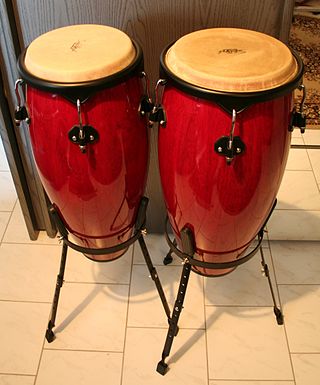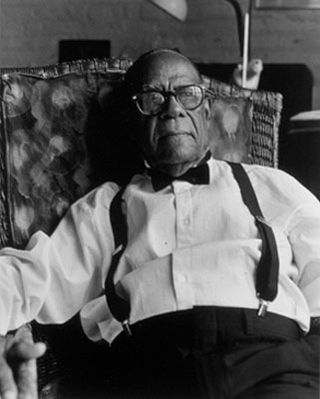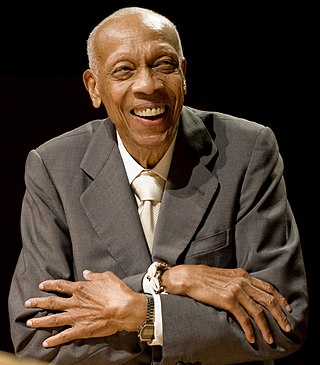Afro-Cubans are Cubans who are of Black African ancestry. The term may also refer to:
Afro-Cubans are Cubans who are of Black African ancestry. The term may also refer to:
Jazz is a music genre that originated in the African-American communities of New Orleans, Louisiana, in the late 19th and early 20th centuries, with its roots in blues, ragtime, European harmony, African rhythmic rituals, spirituals, hymns, marches, vaudeville song, and dance music. Since the 1920s Jazz Age, it has been recognized as a major form of musical expression in traditional and popular music. Jazz is characterized by swing and blue notes, complex chords, call and response vocals, polyrhythms and improvisation.

Salsa music is a style of Caribbean music, combining elements of Cuban, Puerto Rican, and American influences. Because most of the basic musical components predate the labeling of salsa, there have been many controversies regarding its origin. Most songs considered as salsa are primarily based on son montuno and son Cubano, with elements of cha-cha-chá, bolero, rumba, mambo, jazz, R&B, rock, bomba, and plena. All of these elements are adapted to fit the basic Son montuno template when performed within the context of salsa.
Jazz fusion is a popular music genre that developed in the late 1960s when musicians combined jazz harmony and improvisation with rock music, funk, and rhythm and blues. Electric guitars, amplifiers, and keyboards that were popular in rock began to be used by jazz musicians, particularly those who had grown up listening to rock and roll.
Latin jazz is a genre of jazz with Latin American rhythms. The two main categories are Afro-Cuban jazz, rhythmically based on Cuban popular dance music, with a rhythm section employing ostinato patterns or a clave, and Afro-Brazilian jazz, which includes samba and bossa nova.

Callen Radcliffe Tjader Jr. was an American Latin Jazz musician, often described as the most successful non-Latino Latin musician. He explored other jazz idioms, especially small group modern jazz, even as he continued to perform music of Africa, the Caribbean and Latin America.

Dionisio Jesús Valdés Rodríguez, better known as Chucho, is a Cuban pianist, bandleader, composer and arranger whose career spans over 50 years. An original member of the Orquesta Cubana de Música Moderna, in 1973 he founded the group Irakere, one of Cuba's best-known Latin jazz bands.

Ramón "Mongo" Santamaría Rodríguez was a Cuban percussionist and bandleader who spent most of his career in the United States. Primarily a conga drummer, Santamaría was a leading figure in the pachanga and boogaloo dance crazes of the 1960s. His biggest hit was his rendition of Herbie Hancock's "Watermelon Man", which was inducted into the Grammy Hall of Fame in 1998. From the 1970s, he recorded mainly salsa and Latin jazz, before retiring in the late 1990s.
Afro-Cuban jazz is the earliest form of Latin jazz. It mixes Afro-Cuban clave-based rhythms with jazz harmonies and techniques of improvisation. Afro-Cuban music has deep roots in African ritual and rhythm. The genre emerged in the early 1940s with the Cuban musicians Mario Bauzá and Frank Grillo "Machito" in the band Machito and his Afro-Cubans in New York City. In 1947, the collaborations of bebop trumpeter Dizzy Gillespie and percussionist Chano Pozo brought Afro-Cuban rhythms and instruments, such as the tumbadora and the bongo, into the East Coast jazz scene. Early combinations of jazz with Cuban music, such as "Manteca" and "Mangó Mangüé", were commonly referred to as "Cubop" for Cuban bebop.

African popular music, can be defined as any African music, regardless of genre, that uses Western pop musical instruments, such as the guitar, piano, trumpet, etc. Afropop is a genre of music that combines elements from both African traditional music with Western pop music, characterized by the use of African rhythms and melodies, as well as western instrumentation and production techniques. Like African traditional music, Afropop is vast and varied. Most contemporary genres of western popular music build on cross-pollination with traditional African American and African popular music. Many genres in popular music of rock, metal, pop, blues, jazz, salsa, zouk, and rumba derive, of varying degrees, musical traditions from Africa cultured to the Americas, by enslaved Africans. These rhythms and sounds have subsequently been adapted by newer genres like hip-hop, and R&B. Likewise, African popular music have adopted Western music industry recording studio techniques. The term does not refer to a specific style or sound but is used as a general term for African popular music.

Frank Grillo known professionally as Machito, was a Latin jazz musician who helped refine Afro-Cuban jazz and create both Cubop and salsa music. He was raised in Havana with his sister, singer Graciela.

Prudencio Mario Bauzá Cárdenas was an Afro-Cuban jazz, and jazz musician. He was among the first to introduce Cuban music to the United States by bringing Cuban musical styles to the New York City jazz scene. While Cuban bands had had popular jazz tunes in their repertoire for years, Bauzá's composition "Tangá" was the first piece to blend jazz harmony and arranging technique, with jazz soloists and Afro-Cuban rhythms. It is considered the first true Afro-Cuban jazz tune.
Ethno jazz, also known as world jazz, is a subgenre of jazz and world music, developed internationally in the 1950s and '60s and broadly characterized by a combination of traditional jazz and non-Western musical elements. Though occasionally equaled to or considered the successor of world music, an independent meaning of ethno jazz emerged around 1990 through the commercial success of ethnic music via globalization, which especially observed a Western focus on Asian musical interpretations. The origin of ethno jazz has widely been credited to saxophonist John Coltrane.

Dionisio Ramón Emilio Valdés Amaro, better known as Bebo Valdés, was a Cuban pianist, bandleader, composer and arranger. He was a central figure in the golden age of Cuban music, especially due to his big band arrangements and compositions of mambo, chachachá and batanga, a genre he created in 1952.

Armando Peraza was a Cuban Latin jazz percussionist and a member of the rock band Santana. Peraza played congas, bongos, and timbales.
Arturo "Chico" O'Farrill was a Cuban composer, arranger, and conductor, best known for his work in the Latin idiom, specifically Afro-Cuban jazz or "Cubop", although he also composed traditional jazz pieces and even symphonic works.

Luciano Pozo González, known professionally as Chano Pozo, was a Cuban jazz percussionist, singer, dancer, and composer. Despite only living to the age of 33, he played a major role in the founding of Latin jazz. He co-wrote some of Dizzy Gillespie's Latin-flavored compositions, such as "Manteca" and "Tin Tin Deo", and was the first Latin percussionist in Gillespie's band. According to Rebeca Mauleón, "Few percussionists have played as integral a role in shaping Latin music as Luciano 'Chano' Pozo González".
Pucho & His Latin Soul Brothers was a Latin jazz, soul jazz and R&B group formed in 1959 by timbales player Henry "Pucho" Brown. Chick Corea is among the many musicians who performed with him.
Descemer Bueno is a Cuban singer, songwriter, and record producer. His first professional gigs were playing bass with Cuban troubadour Santiago Feliú.

Arturo O'Farrill is a jazz musician, the son of Latin jazz musician, arranger and bandleader Chico O'Farrill, and pianist, composer, and director for the Afro Latin Jazz Orchestra. He is best known for his contributions to contemporary Latin jazz, having received Grammy Awards and nominations, though he has trained in other forms such as free jazz and experimented briefly with hip hop.
Pedrito Martinez is a Cuban percussionist, drummer, singer, dancer, bandleader, songwriter, composer, and educator. He was born and raised in Havana, Cuba. He is a Cuban Conguero performing classic Cuban Rumbas, Afro-Cuban folkloric and religious music. He is a Santería priest. He came to the United States of America from Havana in 1998. He plays the Batá drum, conga, cajón, timbale, and bongo drums, among other percussion instruments. Pedrito learned his craft from the streets of Havana, Cuba. He has performed with Paquito D'Rivera, Arturo O'Farrill, Brian Lynch, and Bruce Springsteen. He settled in the New York City - New Jersey area in 1998.